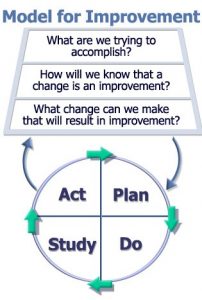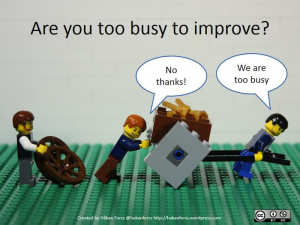Thursday 21 June 2018
Our college sector in Scotland has a strong track record of successfully transforming the lives of learners. We rightly recognise and are proud of our achievements.
College Expo18 provided a fantastic opportunity to showcase and share with each other the innovative work going on in Scotland’s colleges. As a sector, we are ambitious about what we can deliver for students.
We know that achieving our ambitions will not be an easy task. Colleges provide education and training for a wide and diverse group of learners. Responding to their different learning styles and support needs is crucial for ensuring that all learners successfully complete their course and are able to progress to a higher level of study and/or employment.
The most recent figures (for academic year 2016/17) tell us that approximately 25% of students who enrol on full-time FE courses for recognised qualifications fail to complete the course and a further 9.6% fail to complete successfully. Although there are regional variations to this picture, this trend has continued with only minor national improvement since data started to be published in AY 2008/09.
It is in this context that the Minister for Further Education, Higher Education and Science announced the College Improvement Project in March 2017. The project has been developed to provide new tools to enable colleges to take the lead in responding to the attainment challenge. It builds on the sector’s progress to date and complements the new college quality arrangements driving increased success in FE using a tried and tested Quality Improvement (QI) methodology. The methodology has been designed to challenge assumptions and enable the creation of an evidence base of practical interventions to deliver positive change for Scotland’s colleges.
Five colleges have formed an improvement team: Dundee and Angus, Edinburgh, Inverness, New College Lanarkshire and West College Scotland, with support from Scottish Government. Initial work over the current academic year, and the quick-wins that have been achieved, provide early signs that improvements can be made across all aspects of the college experience. However, this is only the start of the journey. There are no silver bullets to addressing the complex interplay of issues affecting student achievement. Developing evidence-based sustainable change takes intentional hard work and commitment.
What is Quality Improvement?
Part of the project has involved providing key colleagues within the five colleges with the QI tools and techniques to enable them to plan and execute Quality Improvement effectively. The first step of this process has been to think about an aim – a clear statement of intent over a specific timeframe – to focus the efforts of each college. In QI we think of this as asking the ‘why.’
Part of the project has involved providing key colleagues within the five colleges with the QI tools and techniques to enable them to plan and execute Quality Improvement effectively. The first step of this process has been to think about an aim – a clear statement of intent over a specific timeframe – to focus the efforts of each college. In QI we think of this as asking the ‘why.’
Once we have an aim, we can begin to build a change theory in the form of a Driver Diagram. Driver Diagrams have become a useful tool in the college improvement context. It allows you to show your aim, the ‘drivers’ or key influences, and your change ideas to achieve your aim, all in one logical space.
The innovative actions, co-created with learners and implemented by the five colleges, make up the change ideas on their Driver Diagram. This is where we introduce the Model for Improvement.
The key concept of improvement is iterative change and learning. We want to plan our change ideas, test them, study what effects they have had, and then amend them to improve the outcomes. This is the Plan, Do, Study, Act (PDSA) approach that is at the heart of the five college’s improvement work.
Using the expertise within the colleges and building on the progress already being made in the sector, the QI methodology is providing the tools for developing a robust and measurable evidence base so that we can say with confidence what works to improve our colleges, and in what context.
Learning from Year One
Over seventy tests of change have been carried out over Year One of the project. Many of these demonstrated some improvement, however, some did not. The learning from this is an important part of the methodology and is crucial for challenging assumptions and making sure that our improvement efforts really are leading to positive change. There have been some surprising results from over the past year. Changes that college teams were sure would lead to an improvement did not demonstrate the improvement predicted. This is just one way in which we are seeing the benefits of using QI.
Over seventy tests of change have been carried out over Year One of the project. Many of these demonstrated some improvement, however, some did not. The learning from this is an important part of the methodology and is crucial for challenging assumptions and making sure that our improvement efforts really are leading to positive change. There have been some surprising results from over the past year. Changes that college teams were sure would lead to an improvement did not demonstrate the improvement predicted. This is just one way in which we are seeing the benefits of using QI.
It is crucial that initial tests of change start small. To enable measurement and demonstrate causal links, we have to work at a micro level. But by doing lots of small tests of change, learning about what works and how it can done reliably, we will ultimately be able to see big improvements.
Despite promising signs from Year One, there have been some challenges along the way for the improvement colleges and it has taken time to develop an understanding of QI that can be used to show when a change has been an improvement.
Yet, to get to where we want to be, we have to create the capacity for trying new things under the testing conditions of the QI methodology so that we can measure the outcomes of these changes. Business as usual will not deliver the outcomes that we are seeking.
The emerging evidence from the project demonstrates the importance of taking a personalised approach to engaging with learners. As Jonny Pearson, Vice-Principal at Edinburgh College notes:
‘Getting the ‘right student on the right course’ is a significant factor in improving both retention and achievement rates in FE. Supporting these students with specific, targeted early intervention is the key to maximising their potential for success’.
This work is already seeing benefits on the ground. A member of teaching staff at Inverness College reports that:
‘The amount of time and effort put in by the staff team has been worthwhile to see students who historically may have been reluctant to participate in group tasks to develop in confidence and engage with their peers’.
What’s next?
We recognise that this is not a two year project. Improving retention and attainment as part of wider system change in the college sector will be a long term endeavour. By building capability in using Quality Improvement across the sector, it is our hope that the methodology will provide all of Scotland’s colleges with a practical approach to implement positive change, and develop an evidence base to share ‘what works’ to improve FE achievement in different contexts and with different groups of learners.
We recognise that this is not a two year project. Improving retention and attainment as part of wider system change in the college sector will be a long term endeavour. By building capability in using Quality Improvement across the sector, it is our hope that the methodology will provide all of Scotland’s colleges with a practical approach to implement positive change, and develop an evidence base to share ‘what works’ to improve FE achievement in different contexts and with different groups of learners.
In the autumn, CDN will be hosting an event on the themes of retention, attainment and progression within FE and HE. We want this to be an opportunity both to provide an update on the College Improvement Project, but also to hear about and learn from other exciting work that is going on in the college sector. Watch this space!












